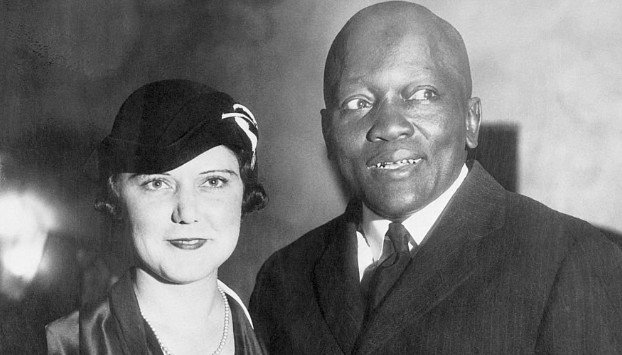Irene Pineau: The Courageous Last Wife of Jack Johnson

Irene Pineau is a name that quietly echoes through the pages of early twentieth-century American history. Known primarily as the third and final wife of the legendary heavyweight boxing champion Jack Johnson, she represents far more than a mere footnote in the life of a sporting icon. Her story sheds light on the cultural and social realities of the United States during a time of racial tension, public fascination with celebrity, and the enduring power of love and loyalty. This comprehensive article explores her life, her marriage to Jack Johnson, and the character and courage that defined her.
Early Life and Background
Born in 1901 in Chicago, Illinois, Irene Pineau grew up in a city buzzing with industry and modernity. Chicago at the turn of the century was a city of great contrasts—teeming with immigrants, alive with opportunity, yet also marked by the complexities of race relations and rapid urban change. Irene’s upbringing in such an environment likely influenced her independence of spirit. Though detailed records of her early life are scarce, the values of perseverance and quiet strength seem to have shaped her character long before she met the man who would define her public identity.
Raised in a middle-class family, Irene received an education that reflected the progressive ideals of her era. She was a young woman at a time when the role of women in society was beginning to shift. The early 1900s saw the suffrage movement gathering momentum and the beginnings of women’s increased participation in public life. Irene’s ability to make independent choices would later become evident in her decision to marry Jack Johnson, a man whose fame and controversy made him one of the most polarising figures of his generation.
Meeting Jack Johnson
Irene’s life changed dramatically in 1924 when she encountered Jack Johnson at a racetrack in Aurora, Illinois. By this time, Johnson was already a legend. He had become the first African American world heavyweight boxing champion in 1908, defeating Tommy Burns and subsequently engaging in the infamous 1910 “Fight of the Century” against James J. Jeffries. Johnson’s career and life had been marked by triumph and scandal in equal measure. He was celebrated for his skill and charisma, yet condemned by many in a racially divided America for both his sporting dominance and his relationships with white women.
For Irene, meeting Johnson was the beginning of a partnership that would require both courage and conviction. Their relationship blossomed despite the social barriers and the scrutiny that inevitably accompanied any public interaction between a black man and a white woman in the United States at that time. Irene was well aware of the potential for criticism, yet she chose love over societal expectations.
Marriage and Life Together
In August 1925, Irene Pineau married Jack Johnson in Waukegan, Illinois. Their union was more than a simple personal commitment; it was a statement of defiance against the racial prejudices of the era. At a time when interracial marriage faced severe stigma and even legal obstacles in many states, Irene’s decision to wed Johnson reflected extraordinary bravery. She stood beside a man who was not only a sporting icon but also a lightning rod for controversy.
Life with Jack Johnson was far from ordinary. Johnson, though past his prime as a fighter, remained a vibrant personality, running nightclubs, travelling widely, and maintaining his status as a larger-than-life figure. Irene accompanied him through these ventures, offering quiet support in the background. She was not a woman seeking the limelight; rather, she played the role of confidante and companion, providing stability to a man whose life had been marked by public battles and personal turbulence.
Their marriage endured for over two decades until Johnson’s death in 1946. Those years were a testament to their resilience as a couple. Irene remained steadfast through times of financial difficulty, public scrutiny, and the lingering racial hostilities that shadowed their lives. Her loyalty was not a passive one; it was the active loyalty of a woman who believed in her partner’s courage and who shared his belief in living life on one’s own terms.
Irene’s Reflections at Johnson’s Funeral
When Jack Johnson died in a car accident in 1946, Irene Pineau paid a moving tribute to her husband at his funeral. She is reported to have said, “I loved him because of his courage… There wasn’t anybody or anything he feared.” These words encapsulated not only the essence of Johnson’s character but also Irene’s own understanding of the man she loved. Her statement reveals the deep admiration and respect she had for his fearless nature, qualities that likely drew her to him in the first place.
Her public words also reveal her own quiet strength. Speaking so openly about her love for a man who had challenged the racial and social conventions of America required as much courage as the life she had shared with him.
Life After Jack Johnson
After Johnson’s death, Irene Pineau lived a comparatively private life. She did not seek publicity or attempt to capitalise on her association with a famous husband. Instead, she chose a life of dignity and discretion. She lived until 1992, passing away in Skokie, Illinois, at the age of ninety-one. Her long life spanned almost the entire twentieth century, from the horse-drawn era of her birth to the dawn of the computer age. Yet she remains remembered primarily for the years she spent with the boxing champion.
Her quiet later years stand in marked contrast to the tumultuous life she experienced alongside Johnson. While he had been a man of spectacle and controversy, Irene’s enduring legacy is one of steadfast loyalty and courage in the face of social pressure.
The Broader Significance of Irene Pineau’s Story
Irene Pineau’s life is significant not only because of her marriage but also because of what it represents in the broader narrative of American history. Her choice to marry Jack Johnson defied the entrenched racial boundaries of her time. In doing so, she joined her husband in a subtle yet powerful act of resistance against discrimination.
Her story is also a reminder of the many women whose contributions to history remain understated. While Johnson’s name is etched in the annals of sport and civil rights, Irene’s life reminds us that behind many great figures stand partners whose courage is less visible but no less important. She embodies the quiet heroism of those who, through personal conviction and loyalty, challenge societal norms and help shape the course of social change.
Conclusion
Irene Pineau’s life was one of quiet yet profound significance. From her early days in Chicago to her decades-long marriage to Jack Johnson and her long life beyond his death, she demonstrated resilience, courage, and unwavering loyalty. In an era when interracial relationships were fraught with danger and disapproval, she chose love and stood by her husband through triumphs and trials alike. Her words at Johnson’s funeral—celebrating his fearlessness—also describe her own spirit. Irene Pineau may not have sought fame, but her life tells a powerful story of love, defiance, and the quiet strength that can leave a lasting mark on history.



